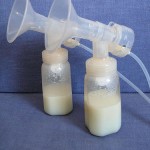Recent Articles
 Breastfeeding your newborn — what to expect in the early weeks - Frequent nursing encourages good milk supply and reduces engorgement. Aim for breastfeeding at least 10 - 12 times per day (24 hours). You CAN'T breastfeed too often--you CAN breastfeed too little. Nurse at the first signs of hunger (stirring, rooting, hands in mouth)--don't wait until baby is crying. Allow baby unlimited time at the breast when sucking actively, then offer the second breast. Some newborns are excessively sleepy at first--wake baby to nurse if 2 hours (during the day) or 4 hours (at night) have passed without nursing.
Breastfeeding your newborn — what to expect in the early weeks - Frequent nursing encourages good milk supply and reduces engorgement. Aim for breastfeeding at least 10 - 12 times per day (24 hours). You CAN'T breastfeed too often--you CAN breastfeed too little. Nurse at the first signs of hunger (stirring, rooting, hands in mouth)--don't wait until baby is crying. Allow baby unlimited time at the breast when sucking actively, then offer the second breast. Some newborns are excessively sleepy at first--wake baby to nurse if 2 hours (during the day) or 4 hours (at night) have passed without nursing. My baby fusses or cries when breastfeeding – what’s the problem? - Some babies will fuss, cry or pull off the breast during nursing. There are a number of reasons why this might be happening. It's pretty common to see this type of behavior at around 6-8 weeks, though it can occur at any time. Here are some of the problem-solving steps I go through when my baby is fussy at the breast or a mother asks me why her baby is fussing during nursing.
My baby fusses or cries when breastfeeding – what’s the problem? - Some babies will fuss, cry or pull off the breast during nursing. There are a number of reasons why this might be happening. It's pretty common to see this type of behavior at around 6-8 weeks, though it can occur at any time. Here are some of the problem-solving steps I go through when my baby is fussy at the breast or a mother asks me why her baby is fussing during nursing. Help — My Baby Won’t Nurse! - The following techniques have proven helpful for a wide range of problems with baby refusing the breast. Some of the babies who might benefit include:
a newborn (or older adopted baby) trying to figure out how to breastfeed...
Help — My Baby Won’t Nurse! - The following techniques have proven helpful for a wide range of problems with baby refusing the breast. Some of the babies who might benefit include:
a newborn (or older adopted baby) trying to figure out how to breastfeed... Engorgement - It is normal for your breasts to become larger and feel heavy, warmer and uncomfortable when your milk increases in quantity (“comes in”) 2-6 days after birth. This rarely lasts more than 24 hours. With normal fullness, the breast and areola (the darker area around the nipple) remain soft and elastic, milk flow is normal and latch-on is not affected.
Engorgement - It is normal for your breasts to become larger and feel heavy, warmer and uncomfortable when your milk increases in quantity (“comes in”) 2-6 days after birth. This rarely lasts more than 24 hours. With normal fullness, the breast and areola (the darker area around the nipple) remain soft and elastic, milk flow is normal and latch-on is not affected. How much expressed milk will my baby need? - Many mothers wonder how much expressed breastmilk they need to have available if they are away from baby.
In exclusively breastfed babies, milk intake increases quickly during the first few weeks of life, then stays about the same between one and six months (though it likely increases short term during growth spurts). Current breastfeeding research does not indicate that breastmilk intake changes with baby's age or weight between one and six months. After six months, breastmilk intake will continue at this same level until -- sometime after six months, depending in baby's intake from other foods -- baby's milk intake begins to decrease gradually
How much expressed milk will my baby need? - Many mothers wonder how much expressed breastmilk they need to have available if they are away from baby.
In exclusively breastfed babies, milk intake increases quickly during the first few weeks of life, then stays about the same between one and six months (though it likely increases short term during growth spurts). Current breastfeeding research does not indicate that breastmilk intake changes with baby's age or weight between one and six months. After six months, breastmilk intake will continue at this same level until -- sometime after six months, depending in baby's intake from other foods -- baby's milk intake begins to decrease gradually Importance of Responsive Feeding - The importance of responsive feeding in establishing a good breastmilk supply by Dr. Amy Brown Responsive parenting e.g. responding promptly and appropriately to a baby’s needs is widely recognised as an important protective element for infant health, wellbeing and development1. When babies feel secure in the care of a primary caregiver, they go on to […]
Importance of Responsive Feeding - The importance of responsive feeding in establishing a good breastmilk supply by Dr. Amy Brown Responsive parenting e.g. responding promptly and appropriately to a baby’s needs is widely recognised as an important protective element for infant health, wellbeing and development1. When babies feel secure in the care of a primary caregiver, they go on to […] Breastfeeding and Marijuana - Marijuana is on the American Academy of Pediatrics Committee on Drugs (2001) list of Drugs of Abuse for Which Adverse Effects on the Infant During Breastfeeding Have Been Reported. The AAP notes "Only 1 report in literature; no effect mentioned; very long half-life for some components."
Breastfeeding and Marijuana - Marijuana is on the American Academy of Pediatrics Committee on Drugs (2001) list of Drugs of Abuse for Which Adverse Effects on the Infant During Breastfeeding Have Been Reported. The AAP notes "Only 1 report in literature; no effect mentioned; very long half-life for some components."
